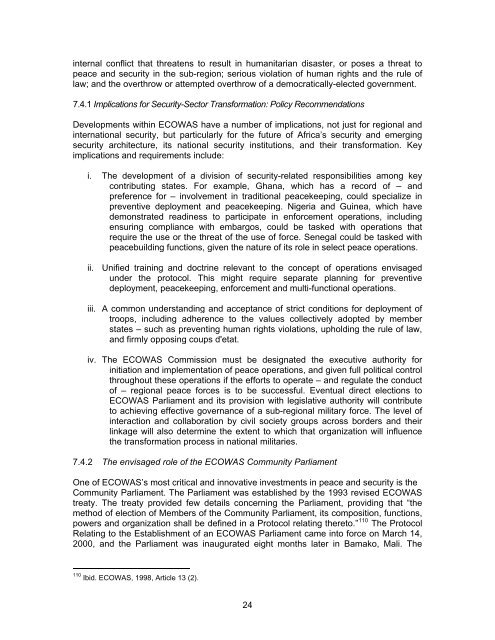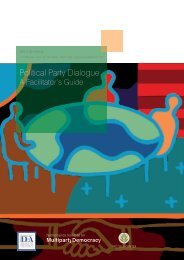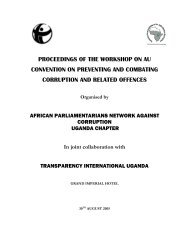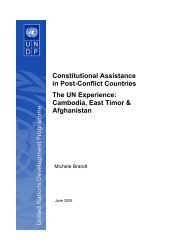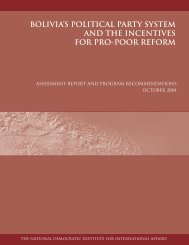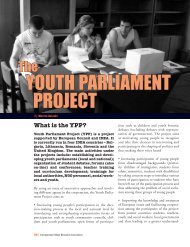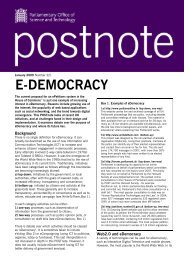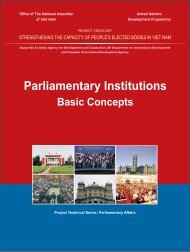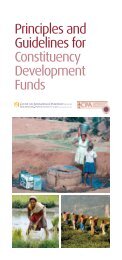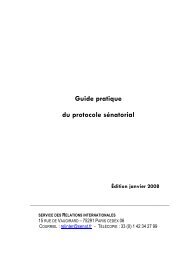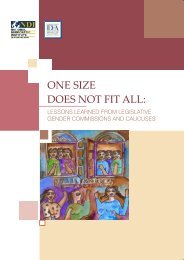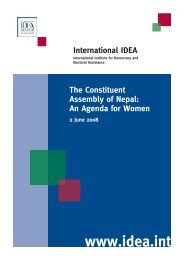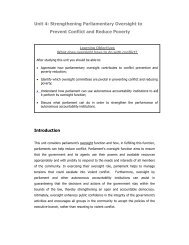internal conflict that threatens to result in humanitarian disaster, or poses a threat topeace and security in <strong>the</strong> sub-region; serious violation <strong>of</strong> human rights and <strong>the</strong> rule <strong>of</strong>law; and <strong>the</strong> overthrow or attempted overthrow <strong>of</strong> a democratically-elected government.7.4.1 Implications for <strong>Security</strong>-<strong>Sector</strong> Transformation: Policy RecommendationsDevelopments within ECOWAS have a number <strong>of</strong> implications, not just for regional andinternational security, but particularly for <strong>the</strong> future <strong>of</strong> Africa’s security and emergingsecurity architecture, its national security institutions, and <strong>the</strong>ir transformation. Keyimplications and requirements include:i. The development <strong>of</strong> a division <strong>of</strong> security-related responsibilities among keycontributing states. For example, <strong>Ghana</strong>, which has a record <strong>of</strong> – andpreference for – involvement in traditional peacekeeping, could specialize inpreventive deployment and peacekeeping. Nigeria and Guinea, which havedemonstrated readiness to participate in enforcement operations, includingensuring compliance with embargos, could be tasked with operations thatrequire <strong>the</strong> use or <strong>the</strong> threat <strong>of</strong> <strong>the</strong> use <strong>of</strong> force. Senegal could be tasked withpeacebuilding functions, given <strong>the</strong> nature <strong>of</strong> its role in select peace operations.ii. Unified training and doctrine relevant to <strong>the</strong> concept <strong>of</strong> operations envisagedunder <strong>the</strong> protocol. This might require separate planning for preventivedeployment, peacekeeping, enforcement and multi-functional operations.iii. A common understanding and acceptance <strong>of</strong> strict conditions for deployment <strong>of</strong>troops, including adherence to <strong>the</strong> values collectively adopted by memberstates – such as preventing human rights violations, upholding <strong>the</strong> rule <strong>of</strong> law,and firmly opposing coups d'etat.iv. The ECOWAS Commission must be designated <strong>the</strong> executive authority forinitiation and implementation <strong>of</strong> peace operations, and given full political controlthroughout <strong>the</strong>se operations if <strong>the</strong> efforts to operate – and regulate <strong>the</strong> conduct<strong>of</strong> – regional peace forces is to be successful. Eventual direct elections toECOWAS Parliament and its provision with legislative authority will contributeto achieving effective governance <strong>of</strong> a sub-regional military force. The level <strong>of</strong>interaction and collaboration by civil society groups across borders and <strong>the</strong>irlinkage will also determine <strong>the</strong> extent to which that organization will influence<strong>the</strong> transformation process in national militaries.7.4.2 The envisaged role <strong>of</strong> <strong>the</strong> ECOWAS Community ParliamentOne <strong>of</strong> ECOWAS’s most critical and innovative investments in peace and security is <strong>the</strong>Community Parliament. The Parliament was established by <strong>the</strong> 1993 revised ECOWAStreaty. The treaty provided few details concerning <strong>the</strong> Parliament, providing that “<strong>the</strong>method <strong>of</strong> election <strong>of</strong> Members <strong>of</strong> <strong>the</strong> Community Parliament, its composition, functions,powers and organization shall be defined in a Protocol relating <strong>the</strong>reto.” 110 The ProtocolRelating to <strong>the</strong> Establishment <strong>of</strong> an ECOWAS Parliament came into force on March 14,2000, and <strong>the</strong> Parliament was inaugurated eight months later in Bamako, Mali. The110 Ibid. ECOWAS, 1998, Article 13 (2).24
Parliament is a 120-member strong body whose members, it is hoped, will eventually bedirectly elected to five-year terms. 111Pending direct elections, national legislative assemblies have electedmembers <strong>of</strong> <strong>the</strong> regional parliament <strong>from</strong> among <strong>the</strong>ir own ranks. This ad hoc transitionalphase was not provided for in <strong>the</strong> Protocol, which is unclear about how parliamentariansshould be chosen. The Parliament is required to meet at least twice a year, in sessionslasting a maximum <strong>of</strong> three months. 112 Extraordinary sessions can be held at <strong>the</strong> request<strong>of</strong> <strong>the</strong> ECOWAS Chairman or a written request by a majority <strong>of</strong> <strong>the</strong> parliamentarians.Each member state is guaranteed at least five seats in <strong>the</strong> Parliament. Forty seats areallocated based on population size, 113For <strong>the</strong> time being, <strong>the</strong> Parliament’s role is mainly advisory. Although it can, in<strong>the</strong>ory, comment on all Community-related issues, it has no legislative powers and it haslimited its purview to human rights and fundamental freedoms. 114 However, it provides aforum for dialogue, consultation, and consensus. ECOWAS has identified improving <strong>the</strong>Parliament’s oversight <strong>of</strong> <strong>the</strong> security sector and its organs as crucial for improving bothgovernance and human rights in <strong>the</strong> sub-region. Moreover, <strong>the</strong>re is a growingrelationship between <strong>the</strong> ECOWAS oversight committee and national legislativeassemblies, including <strong>Ghana</strong>’s PSCD&I in terms <strong>of</strong> exchanging ideas and experiences.There are also two members <strong>of</strong> <strong>Ghana</strong>’s PSCD&I who serve on <strong>the</strong> ECOWASCommittee.There are several uncertainties about how <strong>the</strong> Parliament functions and how itdelegates duties to its committees. Despite <strong>the</strong> history <strong>of</strong> violent conflict, security andconflict prevention were not included as part <strong>of</strong> <strong>the</strong> Community Parliament’s definedareas <strong>of</strong> competence. 115 The Parliament, however, did establish a Committee onDefence, <strong>Security</strong>, and Integration (CDSI) after it convened. But while <strong>the</strong> CDSI it is alegal committee, it does not have legislative powers. Without <strong>the</strong> power to legislate,influence procurement, or influence policymaking and implementation, <strong>the</strong> Committee’soversight over ECOWAS or regional security issues lies solely in <strong>the</strong> merit <strong>of</strong> its actionsand, possibly, its reports. Indeed, at its first plenary session in January 2001, ECOWASparliamentarians elected a Malian politician, Ali Nouhoum Diallo, as speaker. Dialloasserted in his first public statement that his priority would be to maintain peace andsecurity in <strong>the</strong> sub-region. 116 He posited that “[<strong>the</strong> <strong>Parliamentary</strong> Committee on Defenceand <strong>Security</strong>] will have to go to Cote d’Ivoire to pacify <strong>the</strong> nor<strong>the</strong>rn and sou<strong>the</strong>rnpopulation. Next is Liberia and Guinea. There is also no security in…Sierra Leone.” 117Meanwhile, <strong>the</strong> relationship evolving between <strong>the</strong> ECOWAS Parliament’sDefence, <strong>Security</strong>, and Integration Committee and various national government securityorgans is tense, but potentially fruitful. The chair <strong>of</strong> <strong>the</strong> DSCI also identified <strong>the</strong> conflicts111 Ibid. ECOWAS, 2000.112See “Extra Ordinary Session <strong>of</strong> <strong>the</strong> Council <strong>of</strong> Ministers, Final Report,”http://news.ecowas.int/en/presseshow.php?nb=28&lang=en&annee=2006, accessed 3 June 2008.113 Thus, Nigeria, with 110 million people, has 35 seats total. <strong>Ghana</strong> and Cote d’Ivoire have eight and sevenseats, respectively. Burkina Faso, Guinea, Mali, Niger, and Senegal have six members each, and Benin,Cape Verde, <strong>the</strong> Gambia, Guinea Bissau, Liberia, Sierra Leone, and Togo have five each.114 Ibid. <strong>Ghana</strong>ian Times, 4,115 Ibid. ECOWAS, 1994, Article 6.116 Pan African News Agency, 29 January 2001.117 <strong>Ghana</strong>ian Times, 8 January 2001, 4. The cautious tone may be related to <strong>the</strong> ‘illegal’ role that Nigerianlegislators are playing in <strong>the</strong> ECOWAS Parliament. The Protocol does not provide for nor permit double(national and ECOWAS) mandates for parliamentarians. Section 68 <strong>of</strong> <strong>the</strong> 1999 Nigerian Constitutionmeanwhile states that ‘a member…loses his seat in <strong>the</strong> House <strong>of</strong> which he is a member if he becomes amember <strong>of</strong> ano<strong>the</strong>r legislative house’. The ECOWAS Parliament’s decision to fill seats with nationallegislators in lieu <strong>of</strong> direct election thus creates a conflict <strong>of</strong> allegiance and interest for Nigeria’srepresentatives.25


